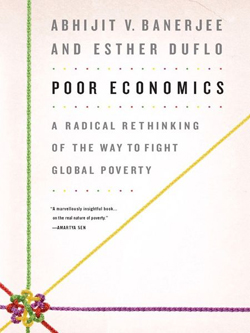Related Research Articles

Sanjay E. Sarma currently serves as CEO, President, and Dean at the Asia School of Business. Additionally, he holds esteemed titles as the Fred Fort Flowers (1941) and Daniel Fort Flowers (1941) Professor of Mechanical Engineering, as well as vice president for Open Learning at the Massachusetts Institute of Technology.

Esther Duflo, FBA is a French–American economist currently serving as the Abdul Latif Jameel Professor of Poverty Alleviation and Development Economics at the Massachusetts Institute of Technology (MIT). In 2019, she was jointly awarded the Nobel Memorial Prize in Economic Sciences alongside Abhijit Banerjee and Michael Kremer "for their experimental approach to alleviating global poverty."

Abhijit Vinayak Banerjee is an Indian-born American economist who is currently the Ford Foundation International Professor of Economics at the Massachusetts Institute of Technology. He is co-founder and co-director of the Abdul Latif Jameel Poverty Action Lab (J-PAL), an MIT based global research center promoting the use of scientific evidence to inform poverty alleviation strategies. In 2019, Banerjee shared the Nobel Memorial Prize in Economic Sciences with Esther Duflo and Michael Kremer, "for their experimental approach to alleviating global poverty." He and Esther Duflo are married, and became the sixth married couple to jointly win a Nobel or Nobel Memorial Prize.
Robert Morris Townsend is an American economist and professor; he is the Elizabeth & James Killian Professor of Economics at Massachusetts Institute of Technology. Prior to joining MIT, he was the Charles E. Merriam Distinguished Service Professor in the Department of Economics at the University of Chicago where he remained a research associate (professor) until 2018.
Innovations for Poverty Action (IPA) is an American non-profit research and policy organization founded in 2002 by economist Dean Karlan. Since its foundation, IPA has worked with over 400 leading academics to conduct over 900 evaluations in 52 countries. The organization also manages the Poverty Probability Index.

The Abdul Latif Jameel Poverty Action Lab (J-PAL) is a global research center working to reduce poverty by ensuring that policy is informed by scientific evidence. J-PAL conducts randomized impact evaluations to answer critical questions in the fight against poverty, and builds partnerships with governments, NGOs, donors, and others to generate new research, share knowledge, and scale up effective programs.

Dean Karlan is an American development economist. He is Chief Economist of USAID and Professor of Economics and Finance at Northwestern University where, alongside Christopher Udry, he co-founded and co-directs the Global Poverty Research Lab at Kellogg School of Management. Karlan is the president and founder of Innovations for Poverty Action (IPA), a New Haven, Connecticut, based research outfit dedicated to creating and evaluating solutions to social and international development problems. He is also a Research Fellow and member of the Executive Committee of the board of directors at the Abdul Latif Jameel Poverty Action Lab (J-PAL) at the Massachusetts Institute of Technology. Along with economists Jonathan Morduch and Sendhil Mullainathan, Karlan served as director of the Financial Access Initiative (FAI), a consortium of researchers focused on substantially expanding access to quality financial services for low-income individuals.
Jonathan Zinman is a professor of economics at Dartmouth College and a research affiliate at the New Haven-based research outfit Innovations for Poverty Action and the Massachusetts Institute of Technology-based Abdul Latif Jameel Poverty Action Lab. Formerly an economist at the Federal Reserve Bank of New York, Zinman is currently a visiting scholar at the Federal Reserve Bank of Philadelphia and Fellow at the Federal Deposit Insurance Corporation Center for Financial Research. Zinman is also a member of the Behavioral Finance Forum and a Research Advisory Board member of stickK, a web-based start-up that enables users to make commitment contracts in order to reach their personal goals.

Rachel Glennerster is a British economist. She is an Associate Professor of Economics at the University of Chicago, and served as chief economist for the Department for International Development (DFID) and the Foreign, Commonwealth & Development Office (FCDO) between 2018 and 2021. She has been announced as the new president for the Center for Global Development (CGD), starting in September 2024.

Poor Economics: A Radical Rethinking of the Way to Fight Global Poverty (2011) is a non-fiction book by Abhijit V. Banerjee and Esther Duflo, both professors of Economics at Massachusetts Institute of Technology (MIT) and Nobel Memorial Prize in Economic Sciences laureates. The book reports on the effectiveness of solutions to global poverty using an evidence-based randomized control trial approach. It won the 2011 Financial Times and Goldman Sachs Business Book of the Year Award.
Amy Nadya Finkelstein is an American economist who is a professor of economics at the Massachusetts Institute of Technology (MIT), the co-director and research associate of the Public Economics Program at the National Bureau of Economic Research, and the co-Scientific Director of J-PAL North America. She was awarded the 2012 John Bates Clark Medal for her contributions to economics. She was elected to the National Academy of Sciences and won a MacArthur "Genius" fellowship in 2018.
Douglas O. Staiger is the John French Professor in Economics at Dartmouth College. His research focuses on the economics of education and of healthcare, and on statistical methods in economics. Staiger is also a co-founder of ArborMetrix, a healthcare analytics company.
Abdul Latif Jameel is a family-owned diversified business founded in Saudi Arabia in 1945 by the late Sheikh Abdul Latif Jameel (1909–1993). Operating across seven core business sectors, Abdul Latif Jameel has a presence in over 30 countries across six continents.
Joseph J. Doyle Jr. is a U.S. American economist and the Erwin H. Schell Professor of Management at the MIT Sloan School of Management. His research focuses on the public economics of healthcare and child welfare. He currently serves as co-director of the MIT Sloan Initiative for Health Systems Innovation and as co-chair of the Health Sector of the Abdul Latif Jameel Poverty Action Lab (J-PAL).

Hassan Mohammed Abdul Latif Jameel is a Saudi businessman and philanthropist. He is Deputy President and Vice Chairman of Saudi Arabia operations of the family-owned international conglomerate business Abdul Latif Jameel, which, among numerous business operations, has distribution rights to Toyota vehicles in Saudi Arabia and other countries. His philanthropy work promotes health and safety, and assists job-seekers and those in need in Saudi Arabia.
The MIT Abdul Latif Jameel Clinic for Machine Learning in Health is a research center at the Massachusetts Institute of Technology (MIT) in the field of artificial intelligence (AI) and health sciences, including disease detection, drug discovery, and the development of medical devices. The MIT Jameel Clinic also supports the commercialization of solutions through grant funding, and has partnered with pharmaceutical companies, like Takeda and Sanofi, and philanthropies, like Community Jameel and Wellcome Trust, to forge collaborations between research and development functions and MIT researchers.
The Abdul Latif Jameel Institute for Disease and Emergency Analytics is a research institute at Imperial College London in the fields of epidemiology, mathematical modelling of infectious diseases and emergencies, environmental health, and health economics. Co-founded in 2019 by Imperial College London and Community Jameel, the Jameel Institute is housed in the School of Public Health, within the college's Faculty of Medicine. The mission of the Jameel Institute is "to combat threats from disease worldwide".

The Research in Color Foundation is a 501(c)(3) nonprofit that looks to enhance the recruitment and retention of economists of colour. It was founded by Chinemelu Okafor in 2019.
Tavneet Suri is a Kenyan development economist currently serving as the Louis E. Seley Professor of Applied Economics at the MIT Sloan School of Management. She is a member of the executive committee of the Abdul Latif Jameel Poverty Action Lab, and a faculty research associate at the National Bureau of Economic Research. Her research focuses on technology adoption and usage in Sub-Saharan Africa.
Emily Louise Breza is an American development economist currently serving as the Frederic E. Abbe Professor of Economics at Harvard University. She is a board member at the Abdul Latif Jameel Poverty Action Lab, and an affiliated researcher at the International Growth Centre and National Bureau of Economic Research. Breza's primary research interests are in development economics, in particular the interplay between social networks and household finance. She is the recipient of a Sloan Research Fellowship.
References
- ↑ "University of Chicago | Bill & Melinda Gates Foundation". Archived from the original on March 14, 2012. Retrieved February 7, 2011.
- ↑ "Members | CFSP | Consortium on Financial Systems and Poverty". Archived from the original on January 9, 2011. Retrieved February 7, 2011.
- ↑ "Overview | the Abdul Latif Jameel Poverty Action Lab". Archived from the original on May 21, 2011. Retrieved February 7, 2011.
- ↑ "Overview | Financial Access Initiative". Archived from the original on March 14, 2011. Retrieved February 7, 2011.
- ↑ "Mission | Innovations for Poverty Action". Archived from the original on July 27, 2011. Retrieved February 7, 2011.
- ↑ "CFSP Vision Statement | CFSP | Consortium on Financial Systems and Poverty". Archived from the original on January 9, 2011. Retrieved February 7, 2011.